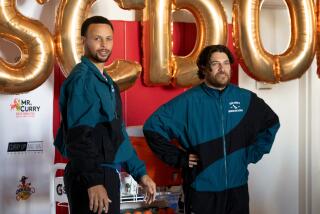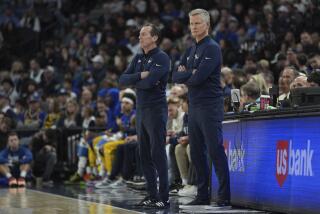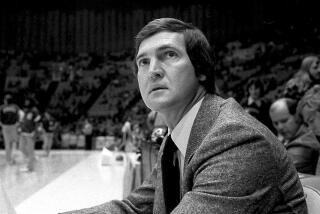Finally Feeling Appreciated
- Share via
PHOENIX — Penny Hardaway and Jason Kidd. All-around brilliance matched with never-ending energy and guile. It could be one of the most dynamic backcourts ever in the NBA.
Yet the question persists: Will this be the all-pro Penny of his early years, or the injury-plagued, complaining, some would say disruptive, Penny of his last two seasons in Orlando?
Hardaway insists he’s relishing a fresh start in Phoenix with a Suns organization that he appreciates and appreciates him.
After all, Kidd rebuilt his image in Phoenix after a rough start in Dallas, why can’t Hardaway do the same?
“A new outlook, new scenery is always good for a professional athlete when he comes from a bad situation,” Kidd said. “I think the best of a person comes out, because they’re out to prove that they can play, and they have the opportunity to shine. It’s a once-in-a-lifetime second chance.”
Hardaway burst into the NBA as one of its brightest young stars. By his second season, he had teamed with Shaquille O’Neal to take the Orlando Magic to the NBA Finals. Hardaway was first-team all-NBA in 1995 and ’96. With his “Little Penny” Nike ads, he was a media darling.
Then everything began to unravel. Shaq left for Los Angeles and Hardaway was sidelined for 23 games in 1996-97 and 63 games in 1997-98 following a knee injury and surgery.
In his final season in Orlando, Hardaway averaged a career-low 15.8 points and was severely criticized as the Philadelphia 76ers swept the Magic in the playoffs.
He was accused of engineering the mutiny that led to the firing of his first coach, Brian Hill, and helping to hasten the retirement of his next coach, Chuck Daly.
Hardaway said he had unbearable pressure and no support from the Magic, coaches included.
“They put pressure on me to be ‘the’ guy, and when I didn’t perform, they killed me,” he said.
Hardaway responded to critics with nasty remarks of his own.
“I didn’t have the coaching staff to defend me. I didn’t have the organization to defend me, and that’s kind of weird being ‘the guy’ down in Orlando,” he said. “I had to defend myself, so I ended up saying some crazy things and making myself look really bad, and that’s where everything went downhill.”
The Suns were almost desperate for an infusion of talent after a mediocre 1999 season. So they pulled off a trade that brought Hardaway to Phoenix along with his new seven-year, $86 million contract--and considerable baggage.
The Suns, under the ownership of Jerry Colangelo, have a reputation of being good to their players. Hardaway said he noticed the difference right away in a meeting with team president Bryan Colangelo, coach Danny Ainge and other members of the team’s coaching staff.
“We’ve talked about things here that I never talked about before with the coach or organization in Orlando, so I’m feeling pretty good about everything that’s gone on here,” Hardaway said. “Just as far as they’re in my corner, that they’re backing me, they’re never going to embarrass me in the paper. They’re never going to point the finger at me.
“They’re never going to put so much pressure on me like I’m the only guy on the basketball team.”
Ainge praises Hardaway’s all-around talent--outside shooting, inside scoring, passing and defense--but said no one should expect him to mesh perfectly with Kidd right away.
“Those guys are special players, but it’s going to take some time,” Ainge said. “I think you’re going to see a lot of great games out of them, and some games that aren’t what people are expecting maybe initially.”
Hardaway believes he would have been one of the league’s best players again no matter where he wound up, but “to play in the backcourt with a guy like Jason makes it so much easier.”
“He’s always been a guy who plays hard at the defensive end, has very good hands, pushes the ball up the floor extremely fast and finds all the guys he needs to find,” Hardaway said. “He has a lot of wind, can run all day and do a lot of great things. He’ll get to balls that you don’t even think he can get to. It makes it so much easier for me because I feed off of him.”
With Kidd at 6-feet-4, and Hardaway 6-7, the backcourt creates a matchup nightmare. Teams will no longer be able to switch their off-guard to defend Kidd, and the smaller point guards will have a tough time guarding him.
Hardaway will be able to defend the bigger shooting guards, allowing the Suns to avoid the mismatches that sometimes occurred last season with Rex Chapman as the off-guard. Hardaway also has experience as a playmaker.
“We’ve got two ball-handlers,” Kidd said. “We’ve got two guys who know how to pass the ball. Points aren’t everything to our games. We’re very unselfish. We rely on our teammates to make us look good. It’s going to be a lot of fun, a lot of touches. A lot of guys are going to get a lot of wide-open shots.”
On the day of the trade, Kidd brashly predicted that he and Hardaway would become the best backcourt in NBA history. Kidd isn’t backing off, but he knows they have to prove it on the court.
“Why not say it if you truly believe it?” he said. “First, we’ve got to win a championship to be considered the best. If you look at Michael and Magic and Larry Bird and those teams, they’ve got the rings. That’s why they’re considered the best in the world.”
More to Read
Go beyond the scoreboard
Get the latest on L.A.'s teams in the daily Sports Report newsletter.
You may occasionally receive promotional content from the Los Angeles Times.










